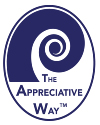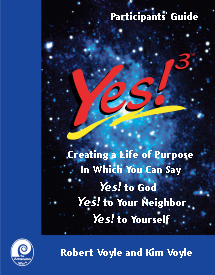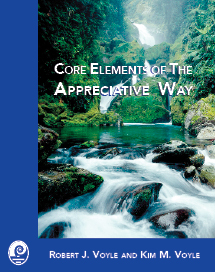

Welcome to Yes!3The Appreciative WayThe Appreciative Way, is Rob and Kim Voyle's synthesis of:
The Career CoachThe Dr. Kim Voyle is the Founder and Director of Pathfinders Career Services. The Clergy CoachThe Rev. Dr. Rob Voyle is a leader in the development and use of appreciative coaching in his work with clergy. From the AuthorsAt its heart Yes!3 simply assumes and uses the belief that we are created by a loving God for a loving purpose. It is our hope and prayer that participants will discover that purpose and lovingly manifest it in the world in a way which is a blessing to others and themselves and evokes wonder and awe of the One who created it all. Subscribers receive monthly Appreciative Tips and notification of our upcoming training programs. Privacy: We never rent, sell, or share your email. |
Literature to Help You Create a Life of Yes!3
Career ResourcesMark Albion. (2000). Making a Life, Making a Living. New York: Warner Books. http://www.makingalife.com/ A quote from the first chapter: "The point of this book is simple: Life is too short to squander. So work only on what really matters. Make a living that ensures a life of giving and loving." This book presents examples of people who have done just that. Laurence Boldt. (1993). Zen and the Art of Making a Living: A Practical Guide to Creative Career Design. New York: Penguin Books. (Latest publication is 1999.) First, the author focuses on finding work that you really want to do, then provides practical, active steps to finding or creating that work. Richard Bolles. (published annually) What Color is your Parachute? Berkeley: Ten Speed Press. The author, who is also an Episcopal priest, has written a new edition of this book every year since 1978. It is one of the most inviting and easy-to-read career and job-hunting resources available. Richard Bolles. (2005). How to Find Your Mission in Life. Berkeley: Ten Speed Press. Deborah Bloch and Lee Richmond. (1998). Soul Work. Palo Alto, CA: Davies-Black Publishing. The authors provide stories and exercises for the reader to consider issues related to the spiritual life and one’s career. They specifically focus on career as a path that includes 7 spiritual and pragmatic themes: change, balance, energy, community, calling, harmony, and unity. Bruce Elkin. (2003). Simplicity and Success: Creating the Life You Long For. Trafford. This book is about integrating simplicity and success. Outlining a simple yet powerful way to create "the simplicity on the other side of complexity," Elkin shows readers how to discover what they love and create a life that shows it. See also Elkin’s web site at http://www.bruceelkin.com for his services on "creating what matters most in life and/or work." Roy Lewis. (1989). Choosing your Career, Finding your Vocation. Mahwah, NJ: Paulist Press. This was one of the first career counseling books which specifically integrated career and spirituality. Gerald Sturman. (1989). If you knew who you were...You could be who you are. Woodstock, NY: Bierman House. Republished in 1993 as The Career Discovery Project by Doubleday, New York. This is a very practical workbook with exercises to identify career type, values, skills, and motivations which allow you to develop your personal career profile. Spirituality and Work ResourcesDavid Adam. (2000). Power Lines: Celtic Prayers about Work. Harrisburg: Morehouse Publishing. A compendium of prayers about the concerns of work. The author writes, "Much of Celtic prayer spoke naturally to God in the working place of life ... Typing pool and workshop, office and factory are all as sacred as the church." Greg Bogart. (1995). Finding your Life’s Calling. Berkeley, CA: Dawn Mountain Press. This book focuses on how to find one’s vocation by reflecting on the inner psychological and spiritual processes. The focus is more on career within one’s own spiritual path. Michael Carroll. (2004). Awake at Work. Boston: Shambala. Michael Carroll’s focus is the transformation of workplace irritations into opportunities for wisdom and enhanced effectiveness. Matthew Fox. (1994). The Reinvention of Work: A New Vision of Livelihood for Our Time. San Francisco: Harper Publishing. Matthew Fox lays out a spirituality of work, particularly looking at our inner work. Then he looks at individuals and organizations that are practicing a spirituality of work. He also includes a "spirituality of Work" questionnaire. Gregg Levoy. (1997). Callings: Finding and Following an Authentic Life. New York: Three Rivers Press. Gregg Levoy utilizes personal stories to discuss the many ways to recognize and translate a call into action. A call in this book is not only defined as something we must "do" but it is also defined as something we must "be." Parker Palmer. (2000). Let Your Life Speak: Listening for the Voice of Vocation. San Francisco: Jossey-Bass. "Is the life I am living the same life that wants to live in me?" The author invites us to be aware of our true self and consider that vocation is not a goal to be achieved but a gift to be received. Parker’s concept of life and purpose has heavily influenced elements of Yes!3 Parker Palmer. (1999). The Active Life: A Spirituality of Work, Creativity, and Caring. San Francisco: Jossey-Bass. Parker Palmer utilizes spiritual perspectives from a variety of religious traditions to explore a spirituality of the busy, active life. Marsha Sinetar. (1998). Holy Work. New York: Crossroads Publishing Company. Marsha Sinetar provides weekly readings for one year to explore the meaning of vocation. Marsha Sinetar. (1995). To Build the Life You Want, Create the Work You Love. New York: St. Martin’s Griffin. This book is a sequel to Do What You Love and the Money Will Follow. The author writes, "The main premise of this book is that authentic occupational success is tied to healthy human development and that its seminal demand is in spiritual growth – our cultivation of those inner gifts and forces that renew and animate our creative energies." She focuses on finding your authentic self and true work. David Spangler. (1996). The Call. New York: Riverhead Books. David Spangler explores the concept of call and focuses on how to listen and follow your inner calling. Pat McHenry Sullivan. (2003). Work with Meaning, Work with Joy. Lanham, MD: Sheed and Ward. Pat Sullivan invites you to engage with God in the ever-changing journey of work. The author writes, "This model assumes that meaning and joy can be found whenever you choose to live and work more consciously and attuned to God’s will." Douglas Thorpe (ed.). (1998). Work and the Life of the Spirit. San Francisco: Mercury House. From ancient to modern, Thorpe has collected writings on work and a spiritual vision of work. Authors include Martin Buber, Hadewijch, Lao-Tsu, St. Paul, Henry David Thoreau, Walt Whitman, and Studs Terkel. Adrian Van Kaam and Susan Muto. (1993). The Power of Appreciation: A New Approach to Personal and Relational Healing. New York: Crossroads Publishing. This book encourages us to view everyday life from an appreciative lens; to give gratitude to God for the daily, life-giving experiences that provide meaning to our lives. Although not specifically focused on work, it is certainly applicable to viewing work from an appreciative perspective. Norvene Vest. (1997). Friend of the Soul: A Benedictine Spirituality of Work. Boston: Cowley. This lay Benedictine scholar applies the Rule of St. Benedict, specifically the rule on work as service to others and what we are called to be and do. Claude Whitmyer (ed.). (1994). Mindfulness and Meaningful Work. Berkeley: Parallax Press. Using the Buddhist Eight-Fold Path, the editor includes Buddhist and Christian authors to identify and develop right livelihood, i.e., finding work that is meaningful, life-affirming, and non-exploitive. Margaret J. Wheatley. (2002). Turning to One Another. San Francisco: Berrett-Koehler. The author states that she wrote this book to encourage people to have conversations about things that are meaningful to them. She includes a section on vocation, focusing on the vocation to be fully human. David Whyte. (1994). The Heart Aroused: Poetry and the Preservation of Soul in Corporate America. New York: Doubleday. From the book: "The Heart Aroused is written for those who have chosen to live our their lives as managers and employees of postmodern Corporate America, and who struggle to keep their humanity in the process." David Whyte. (2001). Crossing the Unknown Sea: Work as a Pilgrimage of Identity. New York: Riverhead Books. David Whyte is known as the poet to corporate America’s soul. In this book he writes, "One of the keys to any possible happiness in work must be the little self-knowledge it takes to know what we desire in life, how we are made, and how we belong to the rest of the world." |
|---|



